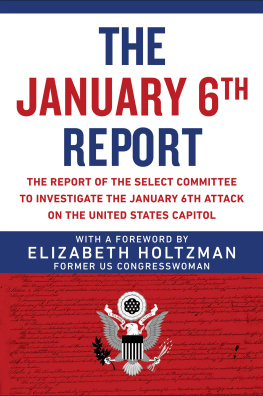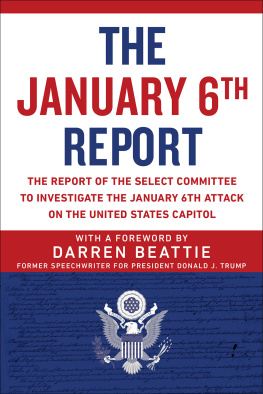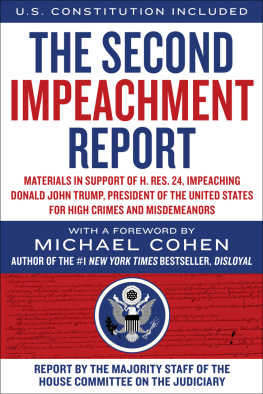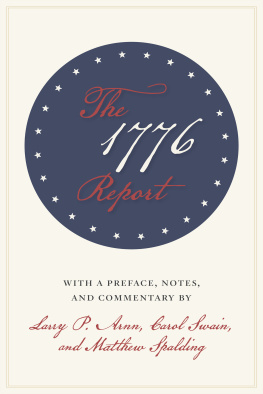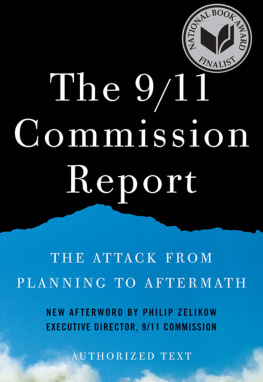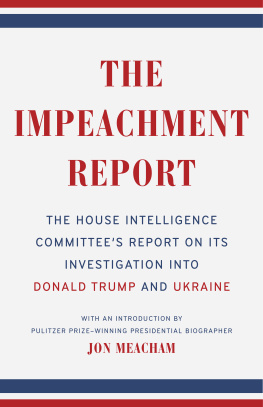Sommaire
Pagination de l'dition papier
Guide
The January 6th Report
Executive Summary
First published in 2022
First Melville House Printing: December 2022
Melville House Publishing
46 John Street
Brooklyn, NY 11201
and
Melville House UK
Suite 2000
16/18 Woodford Road
London E7 0HA
mhpbooks.com
@melvillehouse
ISBN: 978-1-68589-086-5 (Print)
ISBN: 978-1-68589-087-2 (eBook)
Printed in the United States of America
10 9 8 7 6 5 4 3 2 1
This digital document has been produced by Nord Compo.
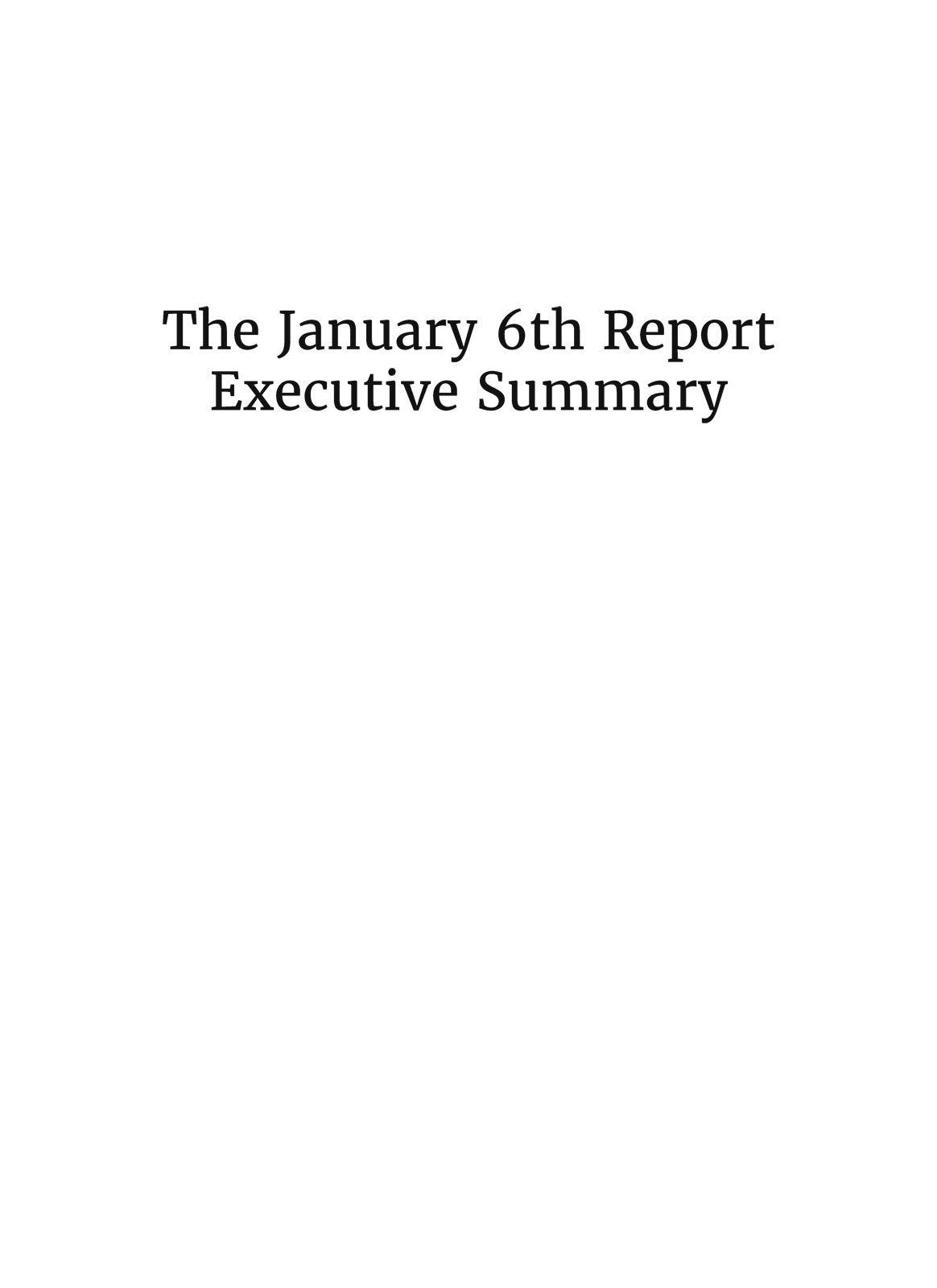
On October 31, 2022, in a Federal courthouse in Washington, DC, Graydon Young testified against Stewart Rhodes and other members of the Oath Keepers militia group. The defendants had been charged with seditious conspiracy against the United States and other crimes related to the January 6, 2021, attack on Congress.
In his testimony that day, Young explained to the jury how he and other Oath Keepers were provoked to travel to Washington by President Donald Trumps tweets and by Trumps false claims that the 2020 Presidential election was stolen from him. Reflecting on that day more than a year and half later, Young testified:
Prosecutor: And so how do you feel about the fact that you were pushing towards a line of police officers?
Young: Today I feel extremely ashamed and embarrassed.
Prosecutor: How did you feel at the time?
Young: I felt like, again, we were continuing in some kind of historical event to achieve a goal.
*
* *
Prosecutor: Looking back now almost two years later, what would that make you as someone who was coming to D.C. to fight against the government?
Young: I guess I was [acting] like a traitor, somebody against my own government.
Youngs testimony was dramatic, but not unique. Many participants in the attack on the Capitol acknowledged that they had betrayed their own country:
Reimler: And Im sorry to the people of this country for threatening the democracy that makes this country so greatMy participation in the events that day were part of an attack on the rule of law.
Pert: I know that the peaceful transition of power is to ensure the common good for our nation and that it is critical in protecting our countrys security needs. I am truly sorry for my part and accept full responsibility for my actions.
Markofski: My actions put me on the other side of the line from my brothers in the Army. The wrong side. Had I lived in the area, I would have been called up to defend the Capitol and restore orderMy actions brought dishonor to my beloved U.S. Army National Guard.
Witcher: Every memberevery male member of my family has served in the military, in the Marine Corps, and most have saw combat. And I cast a shadow and cast embarrassment upon my family name and that legacy.
Edwards: I am ashamed to be for the first time in my 68 years, standing before a judge, having pleaded guilty to committing a crime, ashamed to be associated with an attack on the United States Capitol, a symbol of American democracy and greatness that means a great deal to me.
Hundreds of other participants in the January 6th attack have pleaded guilty, been convicted, or await trial for crimes related to their actions that day. And, like Young, hundreds of others have acknowledged exactly what provoked them to travel to Washington, and to engage in violence. For example:
Ronald Sandlin, who threatened police officers in the Capitol saying, [y]oure going to die, posted on December 23, 2020: Im going to be there to show support for our president and to do my part to stop the steal and stand behind Trump when he decides to cross the rubicon. If you are a patriot I believe its your duty to be there. I see it as my civic responsibility.
Garret Miller, who brought a gun to the Capitol on January 6th, explained: I was in Washington, D.C. on January 6, 2021, because I believed I was following the instructions of former President Trump and he was my president and the commander-in-chief. His statements also had me believing the election was stolen from him.
John Douglas Wright explained that he brought busloads of people to Washington, DC, on January 6th because [Trump] called me there, and he laid out what is happening in our government.
Lewis Cantwell testified: If the President of the United States [is] out on TV telling the world that it was stolen, what else would I believe, as a patriotic American who voted for him and wants to continue to see the country thrive as I thought it was?
Likewise, Stephen Ayres testified that with everything the President was putting out ahead of January 6th that the election was rigged the votes were wrong and stuff it just got into my head. The President [was] calling on us to come to Washington, DC.
The Committee has compiled hundreds of similar statements from participants in the January 6th attack.
House Resolution 503 instructed the Select Committee to investigate and report upon the facts, circumstances, and causes relating to the January 6, 2021, domestic terrorist attack upon the United States Capitol Complex and to issue a final report containing findings, conclusions, and recommendations for corrective measures. The Select Committee has conducted nine public hearings, presenting testimony from more than 70 witnesses. In structuring our investigation and hearings, we began with President Trumps contentions that the election was stolen and took testimony from nearly all of the Presidents principal advisors on this topic. We focused on the rulings of more than 60 Federal and State courts rejecting President Trumps and his supporters efforts to reverse the electoral outcome.
Despite the rulings of these courts, we understood that millions of Americans still lack the information necessary to understand and evaluate what President Trump has told them about the election. For that reason, our hearings featured a number of members of President Trumps inner circle refuting his fraud claims and testifying that the election was not in fact stolen. In all, the Committee displayed the testimony of more than four dozen Republicansby far the majority of witnesses in our hearingsincluding two of President Trumps former Attorneys General, his former White House Counsel, numerous members of his White House staff, and the highest-ranking members of his 2020 election campaign, including his campaign manager and his campaign general counsel. Even key individuals who worked closely with President Trump to try to overturn the 2020 election on January 6th ultimately admitted that they lacked actual evidence sufficient to change the election result, and they admitted that what they were attempting was unlawful.
This Report supplies an immense volume of information and testimony assembled through the Select Committees investigation, including information obtained following litigation in Federal district and appellate courts, as well as in the U.S. Supreme Court. Based upon this assembled evidence, the Committee has reached a series of specific findings, including the following:
. Beginning election night and continuing through January 6th and thereafter, Donald Trump purposely disseminated false allegations of fraud related to the 2020 Presidential election in order to aid his effort to overturn the election and for purposes of soliciting contributions. These false claims provoked his supporters to violence on January 6th.
. Knowing that he and his supporters had lost dozens of election lawsuits, and despite his own senior advisors refuting his election fraud claims and urging him to concede his election loss, Donald Trump refused to accept the lawful result of the 2020 election. Rather than honor his constitutional obligation to take Care that the Laws be faithfully executed, President Trump instead plotted to overturn the election outcome.


